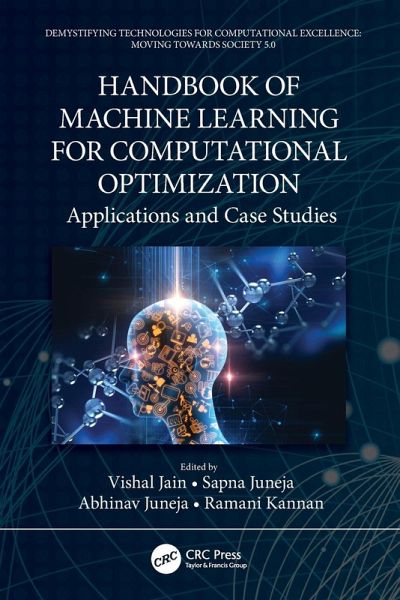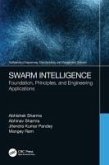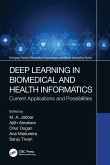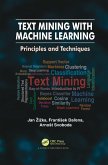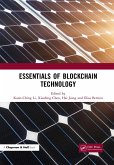Handbook of Machine Learning for Computational Optimization
Applications and Case Studies
Herausgeber: Jain, Vishal; Kannan, Ramani; Juneja, Abhinav; Juneja, Sapna
Handbook of Machine Learning for Computational Optimization
Applications and Case Studies
Herausgeber: Jain, Vishal; Kannan, Ramani; Juneja, Abhinav; Juneja, Sapna
- Broschiertes Buch
- Merkliste
- Auf die Merkliste
- Bewerten Bewerten
- Teilen
- Produkt teilen
- Produkterinnerung
- Produkterinnerung
Machine Learning has emerged as one of the most promising tools used to challenge and think beyond current limitations. This handbook will provide readers with a leading edge to improving their products and processes through optimal and smarter machine learning techniques.
Andere Kunden interessierten sich auch für
![Swarm Intelligence Swarm Intelligence]() Abhishek SharmaSwarm Intelligence74,99 €
Abhishek SharmaSwarm Intelligence74,99 €![Deep Learning in Biomedical and Health Informatics Deep Learning in Biomedical and Health Informatics]() Deep Learning in Biomedical and Health Informatics74,99 €
Deep Learning in Biomedical and Health Informatics74,99 €![Text Mining with Machine Learning Text Mining with Machine Learning]() Jan ¿I¿KaText Mining with Machine Learning100,99 €
Jan ¿I¿KaText Mining with Machine Learning100,99 €![Human Factors and Ergonomics of Prehospital Emergency Care Human Factors and Ergonomics of Prehospital Emergency Care]() Human Factors and Ergonomics of Prehospital Emergency Care80,99 €
Human Factors and Ergonomics of Prehospital Emergency Care80,99 €![Privacy Vulnerabilities and Data Security Challenges in the Iot Privacy Vulnerabilities and Data Security Challenges in the Iot]() Privacy Vulnerabilities and Data Security Challenges in the Iot81,99 €
Privacy Vulnerabilities and Data Security Challenges in the Iot81,99 €![Essentials of Blockchain Technology Essentials of Blockchain Technology]() Essentials of Blockchain Technology70,99 €
Essentials of Blockchain Technology70,99 €![Handbook of Industrial Engineering Equations, Formulas, and Calculations Handbook of Industrial Engineering Equations, Formulas, and Calculations]() Adedeji B BadiruHandbook of Industrial Engineering Equations, Formulas, and Calculations105,99 €
Adedeji B BadiruHandbook of Industrial Engineering Equations, Formulas, and Calculations105,99 €-
-
-
Machine Learning has emerged as one of the most promising tools used to challenge and think beyond current limitations. This handbook will provide readers with a leading edge to improving their products and processes through optimal and smarter machine learning techniques.
Hinweis: Dieser Artikel kann nur an eine deutsche Lieferadresse ausgeliefert werden.
Hinweis: Dieser Artikel kann nur an eine deutsche Lieferadresse ausgeliefert werden.
Produktdetails
- Produktdetails
- Verlag: CRC Press
- Seitenzahl: 280
- Erscheinungstermin: 4. Oktober 2024
- Englisch
- Abmessung: 234mm x 156mm x 16mm
- Gewicht: 417g
- ISBN-13: 9780367685454
- ISBN-10: 0367685450
- Artikelnr.: 71578959
- Herstellerkennzeichnung
- Produktsicherheitsverantwortliche/r
- Europaallee 1
- 36244 Bad Hersfeld
- gpsr@libri.de
- Verlag: CRC Press
- Seitenzahl: 280
- Erscheinungstermin: 4. Oktober 2024
- Englisch
- Abmessung: 234mm x 156mm x 16mm
- Gewicht: 417g
- ISBN-13: 9780367685454
- ISBN-10: 0367685450
- Artikelnr.: 71578959
- Herstellerkennzeichnung
- Produktsicherheitsverantwortliche/r
- Europaallee 1
- 36244 Bad Hersfeld
- gpsr@libri.de
Vishal Jain is an Associate Professor in Deptt. of CSE at Sharda University, Greater Noida, India. He has earlier worked with Bharati Vidyapeeth's Institute of Computer Applications and Management (BVICAM), New Delhi, India (affiliated with Guru Gobind Singh Indraprastha University, and accredited by the All India Council for Technical Education). He first joined BVICAM as Assistant Professor. Before that, he has worked for several years at the Guru Presmsukh Memorial College of Engineering, Delhi, India. He has more than 350 research citation indices with Google scholar (h-index score 9 and i-10 index 9). He has authored more than 70 research papers in reputed conferences and journals including Web of Science and Scopus. He has authored and edited more than 10 books with various reputed publishers including Springer, Apple Academic Press, Scrivener, Emerald and IGI-Global. His research areas include information retrieval, semantic web, ontology engineering, data mining, adhoc networks, and sensor networks. He has recipient a Young Active Member Award for the year 2012-13 from the Computer Society of India, Best Faculty Award for the year 2017 and Best Researcher Award for the year 2019 from BVICAM, New Delhi. Sapna Juneja is Professor in IMS, Ghaziabad, India. Earlier she has worked as Professor in Deptt. of CSE at IITM Group of Institutions and BMIET, Sonepat. She has more than 16 years of teaching experience. She completed her doctorate and masters in Computer Science and Engineering from M.D.University, Rohtak in 2018 and 2010 respectively. Her broad area of research is Software Reliability of Embedded System. Her areas of interest include Software Engineering, Computer Networks, Operating System, Database Management Systems, and Artificial Intelligence etc. She has guided several research thesis of UG and PG students in Computer Science and Engineering. She is editing book on recent technological developments. Abhinav Juneja is currently working as Professor in Deptt. of IT at KIET Group of Institutions, Delhi-NCR, Ghaziabad, India. Earlier, he has worked as Associate Director & Professor in Deptt of CSE at BMIET, Sonepat. He has more than 19 years of teaching experience for post graduate and under graduate engineering students. He completed his Doctorate in Computer Science and Engineering from M.D.University, Rohtak in 2018 and has done masters in Information Technology from GGSIPU, Delhi. He has research interests in the field of Software Reliability, IoT, Machine Learning and soft computing. He has published several papers in reputed national and international journals. He has been reviewer of several journals of repute and has been in various committees of international conferences. Ramani Kannan is currently working as Senior Lecturer, Center for Smart Grid Energy Research, Institute of Autonomous system. University Teknologi PETRONAS (UTP), Malaysia. Dr. Kanan completed Ph.D. (Power Electronics and Drives) from Anna University, India in 2012, M.E. (Power Electronics and Drives) from Anna University, India in 2006, B.E (Electronics and Communication) from Bharathiyar University, India in 2004. He has more than 15 years of experience in prestigious educational institutes. Dr. Kanan has published more than 130 papers in various reputed nation and international journals and conferences. He is the editor, co-editor, guest editor and reviewer of various books including Springer Nature, Elsevier etc. He has received award for best presenter in CENCON 2019, IEEE Conference on Energy Conversion (CENCON 2019) Indonesia.
Chapter 1 Random Variables in Machine Learning Chapter 2 Analysis of EMG
Signals using Extreme Learning Machine with Nature Inspired Feature
Selection Techniques Chapter 3 Detection of Breast Cancer by Using Various
Machine Learning and Deep Learning Algorithms Chapter 4 Assessing the
Radial Efficiency Performance of Bus Transport Sector Using Data
Envelopment Analysis Chapter 5 Weight-Based Codes-A Binary Error Control
Coding Scheme-A Machine Learning Approach Chapter 6 Massive Data
Classification of Brain Tumors Using DNN: Opportunity in Medical Healthcare
4.0 through Sensors Chapter 7 Deep Learning Approach for Traffic Sign
Recognition on Embedded Systems Chapter 8 Lung Cancer Risk Stratification
Using ML and AI on Sensor- Based IoT: An Increasing Technological Trend for
Health of Humanity Chapter 9 Statistical Feedback Evaluation System Chapter
10 Emission of Herbal Woods to Deal with Pollution and Diseases:
Pandemic-Based Threats Chapter 11 Artificial Neural Networks: A
Comprehensive Review Chapter 12 A Case Study on Machine Learning to Predict
the Students' Result in Higher Education Chapter 13 Data Analytic Approach
for Assessment Status of Awareness of Tuberculosis in Nigeria Chapter 14
Active Learning from an Imbalanced Dataset: A Study Conducted on the
Depression, Anxiety, and Stress Dataset Chapter 15 Classification of the
Magnetic Resonance Imaging of the Brain Tumor Using the Residual Neural
Network Framework
Signals using Extreme Learning Machine with Nature Inspired Feature
Selection Techniques Chapter 3 Detection of Breast Cancer by Using Various
Machine Learning and Deep Learning Algorithms Chapter 4 Assessing the
Radial Efficiency Performance of Bus Transport Sector Using Data
Envelopment Analysis Chapter 5 Weight-Based Codes-A Binary Error Control
Coding Scheme-A Machine Learning Approach Chapter 6 Massive Data
Classification of Brain Tumors Using DNN: Opportunity in Medical Healthcare
4.0 through Sensors Chapter 7 Deep Learning Approach for Traffic Sign
Recognition on Embedded Systems Chapter 8 Lung Cancer Risk Stratification
Using ML and AI on Sensor- Based IoT: An Increasing Technological Trend for
Health of Humanity Chapter 9 Statistical Feedback Evaluation System Chapter
10 Emission of Herbal Woods to Deal with Pollution and Diseases:
Pandemic-Based Threats Chapter 11 Artificial Neural Networks: A
Comprehensive Review Chapter 12 A Case Study on Machine Learning to Predict
the Students' Result in Higher Education Chapter 13 Data Analytic Approach
for Assessment Status of Awareness of Tuberculosis in Nigeria Chapter 14
Active Learning from an Imbalanced Dataset: A Study Conducted on the
Depression, Anxiety, and Stress Dataset Chapter 15 Classification of the
Magnetic Resonance Imaging of the Brain Tumor Using the Residual Neural
Network Framework
Chapter 1 Random Variables in Machine Learning Chapter 2 Analysis of EMG
Signals using Extreme Learning Machine with Nature Inspired Feature
Selection Techniques Chapter 3 Detection of Breast Cancer by Using Various
Machine Learning and Deep Learning Algorithms Chapter 4 Assessing the
Radial Efficiency Performance of Bus Transport Sector Using Data
Envelopment Analysis Chapter 5 Weight-Based Codes-A Binary Error Control
Coding Scheme-A Machine Learning Approach Chapter 6 Massive Data
Classification of Brain Tumors Using DNN: Opportunity in Medical Healthcare
4.0 through Sensors Chapter 7 Deep Learning Approach for Traffic Sign
Recognition on Embedded Systems Chapter 8 Lung Cancer Risk Stratification
Using ML and AI on Sensor- Based IoT: An Increasing Technological Trend for
Health of Humanity Chapter 9 Statistical Feedback Evaluation System Chapter
10 Emission of Herbal Woods to Deal with Pollution and Diseases:
Pandemic-Based Threats Chapter 11 Artificial Neural Networks: A
Comprehensive Review Chapter 12 A Case Study on Machine Learning to Predict
the Students' Result in Higher Education Chapter 13 Data Analytic Approach
for Assessment Status of Awareness of Tuberculosis in Nigeria Chapter 14
Active Learning from an Imbalanced Dataset: A Study Conducted on the
Depression, Anxiety, and Stress Dataset Chapter 15 Classification of the
Magnetic Resonance Imaging of the Brain Tumor Using the Residual Neural
Network Framework
Signals using Extreme Learning Machine with Nature Inspired Feature
Selection Techniques Chapter 3 Detection of Breast Cancer by Using Various
Machine Learning and Deep Learning Algorithms Chapter 4 Assessing the
Radial Efficiency Performance of Bus Transport Sector Using Data
Envelopment Analysis Chapter 5 Weight-Based Codes-A Binary Error Control
Coding Scheme-A Machine Learning Approach Chapter 6 Massive Data
Classification of Brain Tumors Using DNN: Opportunity in Medical Healthcare
4.0 through Sensors Chapter 7 Deep Learning Approach for Traffic Sign
Recognition on Embedded Systems Chapter 8 Lung Cancer Risk Stratification
Using ML and AI on Sensor- Based IoT: An Increasing Technological Trend for
Health of Humanity Chapter 9 Statistical Feedback Evaluation System Chapter
10 Emission of Herbal Woods to Deal with Pollution and Diseases:
Pandemic-Based Threats Chapter 11 Artificial Neural Networks: A
Comprehensive Review Chapter 12 A Case Study on Machine Learning to Predict
the Students' Result in Higher Education Chapter 13 Data Analytic Approach
for Assessment Status of Awareness of Tuberculosis in Nigeria Chapter 14
Active Learning from an Imbalanced Dataset: A Study Conducted on the
Depression, Anxiety, and Stress Dataset Chapter 15 Classification of the
Magnetic Resonance Imaging of the Brain Tumor Using the Residual Neural
Network Framework

